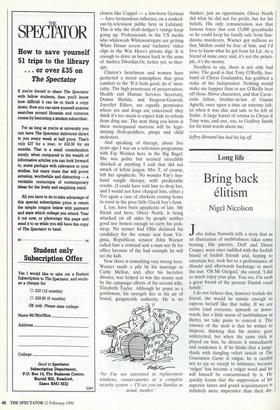Long life
Bring back elitism
Nigel Nicolson
John Julius Norwich tells a story that as an illustration of snobbishness takes some beating. His parents, Duff and Diana Cooper, were once saddled with the foolish friend of foolish friends and, hoping to entertain her, took her to a performance of Hamlet and afterwards backstage to meet the star. 'Oh Mr Gielgud,' she oozed, 'I did so much enjoy your play. You see, I'm such a great friend of the present Danish royal family.'
I do not believe that, however foolish the friend, she would be unwise enough to express herself like that today. If we are snobs (and everyone, upwards or down- wards, has a little worm of snobbishness in them), we take pains to conceal it. The essence of the snob is that he wishes to impress, thinking that his motive goes undetected, but when the same trick is played on him, he detects it immediately and condemns it. If he thinks that a lamp- shade with dangling velvet tassels or The Generation Game is vulgar, he is careful not to say so except to intimates, because 'vulgar' has become a vulgar word and he will himself be contaminated by it. He quickly learns that the suppression of his superior tastes and grand acquaintances is infinitely more impressive than their dis- play. If asked where he spent the weekend, he replies, 'With friends in Derbyshire', when in fact he has been at Chatsworth. There will even be the rare non-snob who hopes that the true identity of his host will never be discovered.
The Lady Bracknells, if they ever existed, have not survived the scrutiny of the post- war world, and even pre-war the sophisti- cated snob was more guilty of aspiring upwards than sneering downwards. They were competitive name-droppers. Thus Lady Colefax would never exclude from her parties someone just because he spoke with a provincial accent, but when her arch-rival Lady Cunard mentioned casually that she had had a letter from the Italian ambassador about his latest interview with Mussolini, and asked sweetly, 'Have you heard from Dino, Sibyl?' she scored heavily with her reply, 'Only by telegram.'
In our own day, the transparency and futility of snobbishness have never been better exposed than by Penelope Keith in To the Manor Born, for though she at first thought Peter Bowles a vulgar little upstart, she warmed to him, finding him, in spite of herself, amusing and attractive, while he, having raised himself from Czech penury by his own efforts, felt no need to curry favour with someone who had arrived at the same point without merit. How can you be a lion-hunter if you are yourself the lion?
Snobbishness, therefore, is on the decline, if not quite extinct. If I were called Lord Aloysius Cavendish, I might expect people to sit up and take notice, but only momentarily. Once a name like that would have been a passport that need never be renewed but now Lord Aloysius would be judged by his performance, and perfor- mance can take many forms. Lord Chester- field remarked that a gentleman is a man who can play the trumpet but doesn't; but Humphrey Lyttelton plays the trumpet and is.
We must restore to respectability the concept of elitism, which has been prac- tised by every nation in every age to its great advantage. It is practised universally today, but we are shy of it, confusing it with snobbishness, when it is simply a recogni- tion that some people are much better at their jobs than most other people. It is, after all, more enviable to be Sir John Giel- gud than a member of the Danish royal family.
music.'



















































 Previous page
Previous page